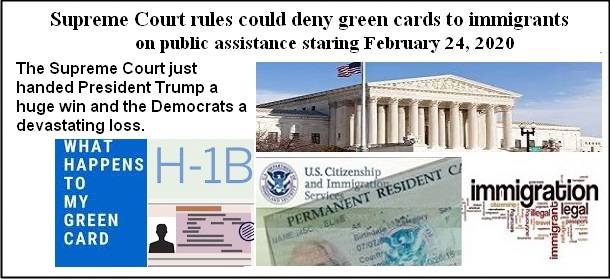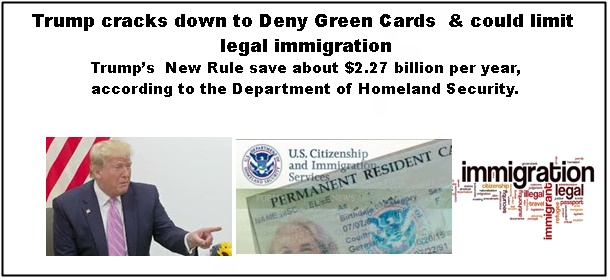| Connecting
over 25 millions NRIs worldwide |
|
|||||||||||||||||||||||
|
||
Supreme Court rules could deny green cards to immigrants on public assistance staring February 24, 2020The Supreme Court just handed President Trump a huge win and the Democrats a devastating loss.
"Public Charge" No medical care, food, shelter and other basic necessities, or are predicted to use them in the future. Los Angeles, Feb. 23, 2020 On Friday, February 22, the Supreme Court ruled in favor of the Trump administration by 5-4 court greenlighted the so-called "public charge" rule across the country. It means Supreme Court is allowing a rule that would make it more difficult for immigrants to obtain legal status if they use public benefits like food stamps and housing vouchers to go into effect in every state. US Citizenship and Immigration Services says it will implement the rule on Monday, February 24 The public charge rule allows immigration officials to decide whether someone can enter the U.S. based on their socioeconomic status. Under the Immigration and Nationality Act, would make it harder for immigrants who are “likely at any time to become a public charge” to obtain green cards. Stephanie Ann Grisham, an American White House official who serves as the 30th White House press secretary and as the current White House communications director said: The White House on Saturday praised the Supreme Court's ruling. We are gratified by the Supreme Court ruling on Friday night lifting the final remaining injunction on the public charge regulation This final rule will protect hardworking American taxpayers, safeguard welfare programs for truly needy Americans, reduce the Federal deficit, and re-establish the fundamental legal principle that newcomers to our society should be financially self-reliant and not dependent on the largess of United States taxpayers. Director of U.S. Citizenship and Immigration Services Ken Cuccinelli has described the rule as simply verifying that immigrants “can stand on their two feet.” The rule was published in August 2019 and expected to take effect in October 2019. Multiple lawsuits were filed, and several federal courts issued injunctions, temporarily stopping the rule from being implemented while the cases made their way through the courts. New rule will not into effect on current PRs who already taking Medicaid, SNAP, and housing benefits:It went into effect on February 24, 2020, however, Medicaid, SNAP, and housing benefits used before this date will not be considered under the new rule. 11% non-citizen Indian families receive public benefits and now they will now be under the scanner. Federal law already requires those seeking green cards and legal status to prove they will not become a “public charge,” or a burden on the U.S. The “public charge” inadmissibility test was established by the U.S. Congress in 1883 and allowed the U.S. government to deny a person a green card, an extension of a visa or admission into the U.S.
It is important to note that the concept of public charge is not defined in statute. Since 1999 the INS adopted the guiding principle that public charge is someone “primarily dependent on the government for subsistence,” as demonstrated by either using federal or state public cash assistance or institutionalization for long-term care at government expense. Under the new rules, benefits previously excluded from the public charge determination will only be considered if the applicant received them after the date of implementation (yet to be determined. . Which Public Benefits Will Be Excluded From the New Public Charge Determination? Benefits excluded from the public charge determination include:
xxxxxxxxxxxxxxxxxxxxxxxxxxxxxxxxxxxxxxxxxxxxxxxxxxxxxxxxxxxxxxxxxxxxxxxxxxxxxxxxxxxxxxxxxx August 12, 2019
The Trump administration’s new rule would disqualify or deny green cards/ permanent residency to legal immigrants if they use certain public-assistance programs such as Medicaid, food stamps, housing vouchers - Section 8 housing assistance or any other forms of public assistance. Immigration officials will consider the “totality of circumstances” when determining whether to deny green cards or bar prospect immigrants from entry. This rule could dramatically cut the number of legal immigrants allowed to enter and stay in the US by making it easier to reject green card and visa applications. "Through the public charge rule, President Trump's administration is re-enforcing the ideal of self-sufficiency and personal responsibility, ensuring that immigrants are able to support themselves and become successful in America," acting U.S. Citizenship and Immigration Services director Ken Cuccinelli said.
The new rule will go into effect in mid-October and won’t apply retroactively.
|
||
Read More |


